Cooperation Period: November 2006 to November 2009
- Executing Agency: Hanoi Urban Environment Company (Hanoi URENCO)
Summary
The rapid economic development and urbanization of Vietnam have resulted in an increase in solid waste, particularly in cities. As of 2003, the annual waste generated in the country was 15 million tons, at least 12.8 million of which were produced by cities such as Hanoi and Ho Chi Minh City. About 30 percent of this urban garbage lies on public roads uncollected or is disposed illegally in lakes or ponds, creating improper drainage conditions and underground water pollution.
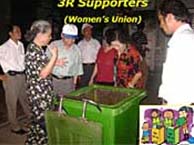
To address the situation, the Vietnamese government is taking steps such as revising its environmental protection laws and adopting Vietnam Agenda 21, a program focused on sustainable development with care for the environment. As a part of this organization, the concept of reduce, reuse, recycle (the 3Rs) is given high precedence under the 3R Initiative.
In Hanoi, the reduction of solid waste and recycling are being promoted as part of a national strategy, though the infrastructures to do so are lacking. Currently, the scope of collection is limited as only those objects of value are collected by informal collectors. To build a recycling community based on the 3R Initiative, the citizens of Hanoi must adequately understand the 3Rs and the issues of waste, and further, an urban garbage management system must be created whose basic functions are the collection and separation of waste.
JICA therefore implemented this technical cooperation project (3R-HN) toward creating a recycling community with cooperation from Hanoi URENCO and related agencies. Under 3R-HN, four model areas were being created in Hanoi, where waste was separated and then collected or composted. Environmental education activities were also being carried out to teach Hanoi citizens the Japanese concept of “mottainai” or the importance of the 3Rs. Based on the results of the separation and collection project in the model districts, a strategic paper was being prepared toward improving the urban garbage collection system through discussion by a wide range of stakeholders and organization of the “3R Stars.”
It is hoped that 3R-HN will put the 3Rs into practice in Hanoi and contribute toward the creation of a recycling-oriented community.
Project Highlights
Gaining Ground – the 3R Movement
Mr. Nguyen Van Hoa, then-Deputy Director of Hanoi URENCO, made an appeal about the garbage crisis, saying that if waste continues to increase at the current rate, the Nam Son landfill would soon break down. He said, “We cannot ignore the adverse effects on the environment—the disposal expenses, odors and water pollution. It is imperative that the government and the citizens think together to find solutions.”
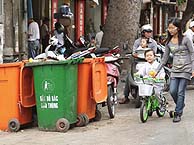
In November 2006, URENCO and JICA began the project based on mutual cooperation. The 3R-HN was a comprehensive residential environment improvement project to separate and collect garbage, implement composting and provide environment education in four districts within Hanoi.
Citizen Cooperation Indispensible for 3R Success
Since separation and collection began using the 3R concept, the amount of garbage lying on the streets has decreased in the model districts. Ms. Nguyen Thi Hien, a member of the housewife committee in the Lang Ha district said, “I was so happy when I heard about the 3Rs. It’s also so encouraging to have all of this cooperation from the Japanese experts.”
Organizations have been springing up such as the 3R Volunteer Club (3R-VC) made up of students and young workers in their twenties, and the Go Green Club (GGC), which is affiliated with people having concern for environmental problems.
Ms. Dang Lang Ngoc of the 3R-Volunteer Club (3R-VC) and Ms. Dang Ngoc Phuong of the Go Green Club (GGC) expressed the need for the energy of young people to educate society on the environment. They are inspired to create a great environmental movement that is powered by events and activities.
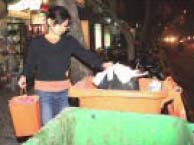
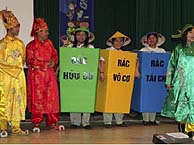
Activities of the 3R-VC and GGC include environmental education for children in a “Mottainai Fair” and creating a “free market” for participants to exchange unwanted items. With the support of Toyota and the FPT Group of Vietnam, they also manufacture and distribute eco-bags made from post-consumer plastic as part of their campaign to educate people on the magnitude of the environmental problem.
Continued PR the Key to Success
Ms. Luong Thi Man Huong works at the environmental education and public relations division of URENCO and thinks about the future of the 3R movement. Ms. Huong said, “I have heard that it took 12 years to establish separation and collection in Japan. I’m sure it takes continued efforts to convince citizens to change their long-term habits.”
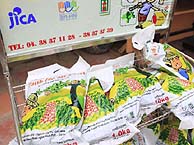
3R-HN was completed in November, 2009. Nowadays, voluntary activities to separate and collect garbage have also been started outside of the model areas. This brings great hope for further expansion of the 3R-HN’s outputs.
Photography and cooperation in writing: Masato Nishigai of the Nishigai Photo Studio





scroll